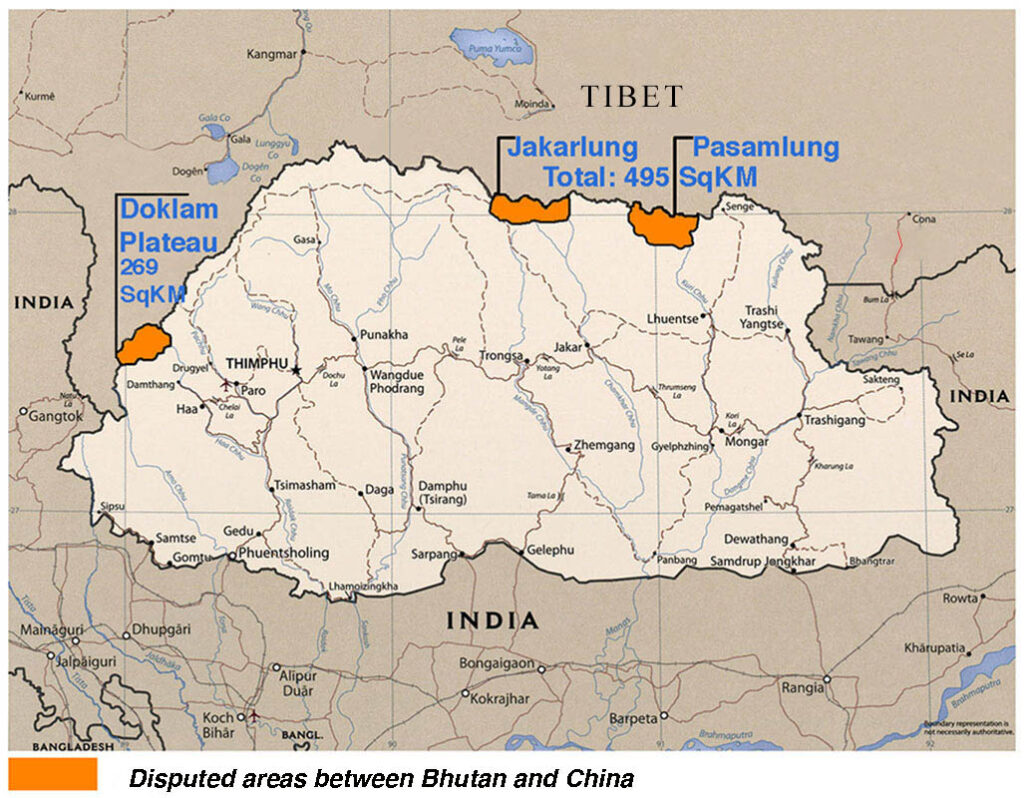(TibetanReview.net, Jan27’23) – A joint statement by China and Bhutan in their Kunming meeting two weeks ago, insisting that a “positive consensus” had been reached between them to increase the frequency of their talks for the settlement of their border dispute, took many by surprise, reported the scmp.com Jan 25. Still, Bhutan would be in no position to give China what it wants, as it would be detrimental to the strategic concerns of India, its core business and development partner, the report said.
The talks even promised a swift implementation of a mysterious agreement that the two sides had signed in 2021, a “three-step road map” to resolve their dispute, the contents of which have not been unveiled, the report noted.
And so, less than a week after the joint statement, India’s foreign secretary Vinay Mohan Kwatra visited the kingdom and held meetings with its King Jigme Khesar Namgyel Wangchuck as well as Prime Minister Lotay Tshering.
The report noted that it was the third high-level Indian visit to Bhutan in the past nine months, after external affairs minister S Jaishankar visited in April last year, followed by Indian Army chief General Manoj Pande’s trip in July.
The Indian embassy in Bhutan has described the discussions as “wide-ranging”, covering “the entire gamut of bilateral relations”, from energy cooperation to trade to their development partnership.
The report cited analysts as being of the view that Kwatra’s visit was a sign of India’s growing concerns over the prospects of Bhutan and China moving closer to a resolution of their boundary dispute.
* * *
Bhutan holds immense strategic significance for both the sides: to its north and northwest is China’s sensitive occupied territory of Tibet, whereas it is surrounded on all other sides by India’s northeastern region, parts of which are claimed by China. New Delhi’s strategic circles see Bhutan as a so-called buffer state that separates India and China, the report noted.
Aditya Gowdara Shivamurthy, a junior fellow at the Observer Research Foundation think tank, has said the talks were “very significant” for Bhutan, with China disputing “nearly 25%” of the country’s landmass.
As part of the boundary negotiations, Beijing has in the past offered Thimphu a “swap” of the disputed territories, with China promising to relinquish its demands in northern Bhutan if its claims over regions in northwestern Bhutan were recognized, the report said.
This is seen to present a huge dilemma to Bhutan, and tricky situation for New Delhi.

“These claims that China has been making in Bhutan’s northwest, they are all around areas that have strategic importance for India,” Medha Bisht, associate professor in the department of international relations, at the South Asian University in New Delhi, has said, pointing to the northwestern sector’s disputes in four regions and two valleys, including the Doklam region.
The Doklam region, which China covets, is crucial for New Delhi since it lies at the trijunction between China, Bhutan and India. War strategists in New Delhi believe that access to the region would help China mobilise troops and armoury very swiftly in a war scenario with India, the report noted.
It is also seen as offering the Chinese People’s Liberation Army a very dominant position in trying to restrict India’s access to its northeastern region, by “choking” the Siliguri corridor, a 22km-wide strip of land connecting mainland India to its northeastern region. So crucial is the region that a Chinese plan to construct a road there triggered a 72-day stand-off between Indian and Chinese soldiers in 2017, the report said.
Hence, any agreement by Bhutan to such a swap would grievously harm India’s strategic interests.
* * *
On Bhutan, there is a growing domestic pressure to settle the dispute with China, even if doing so could harm New Delhi’s interests, Amit Ranjan, a research fellow at the National University of Singapore’s Institute of South Asian Studies, has said.
“There is a section of the population that believes that there is an immense dependence in Bhutan on India. … This section wants to resolve the dispute, have stronger ties with China so as to facilitate trade with it,” Ranjan has added.
However, Ranjan thinks it is unlikely that Bhutan will agree to China’s swap deal, pointing to Bhutan’s dependence on India as a core reason. The landlocked country gets 75% of its imports from its southern neighbour, which is also the destination for 95% of Bhutan’s exports. India also contributes significantly to Bhutan’s development budgets, and acts as the transit point for Bhutan’s trade with other partners.
“Bhutan would never do anything that would harm India’s strategic interests in the region,” Ranjan has said.


